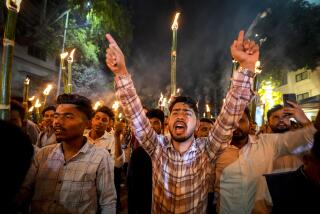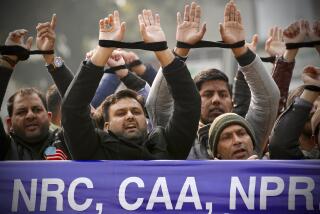In India, you can no longer divorce a woman simply by saying (or texting) it three times

The controversial practice known as instant triple talaq — in which a man tells a woman “I divorce you” three times in succession — is observed in only a handful of countries, including Saudi Arabia. (Aug. 22, 2017) (Sign up for our free video newsl
India’s Supreme Court on Tuesday banned a rare form of instant divorce sanctioned in its most conservative Muslim communities, saying men could no longer dissolve a marriage simply by stating it three times.
The controversial practice known as instant triple talaq — in which a man tells a woman “I divorce you” three times in succession — is observed in only a handful of countries, including Saudi Arabia.
By a 3-2 judgment, India’s highest court said the practice was un-Islamic and violated India’s constitution, and ordered Parliament to pass a law on the issue within six months.
The decision was hailed as a victory for women’s rights advocates led by Shayara Bano, who filed suit in 2016 after her husband ended their 15-year marriage by writing the word “talaq,” or “I divorce you,” three times in a letter sent to her parents’ house.
Other plaintiffs later joined the case, including a woman whose husband divorced her in a letter sent by express mail.
The case generated intense interest in India as other women came forward with stories of how their husbands had dissolved their marriages via text message or, in one case, by placing a newspaper ad.
“I welcome and support the judgment,” Bano told the ANI news agency. “This is a historic day for Muslim women.”
Religious scholars say that according to Islamic law, a divorce must be spread over three months, giving a couple the chance to reconcile. More than a dozen Muslim-majority countries have banned triple talaq, including Iran and Pakistan, but it has persisted in India because there is no uniform set of laws governing marriage, inheritance and divorce.
The two dissenting judges said India could not outlaw triple talaq because it would infringe on individual freedoms.
S. Irfan Habib, a historian, called the practice “hideous, oppressive and gender insensitive” but said it had persisted for centuries because of convenience and the patriarchal views of conservative Muslim societies.
“The instances of instant triple talaq are very few. But why should even a few women suffer?” Habib said. “No decent, sensible man would indulge in instant triple talaq. Whoever does it is not even a good human being, forget a good husband. The practice should have been outlawed long ago.”
India is home to nearly 200 million Muslims — the largest minority in a Hindu-majority country of 1.3 billion people. Some clerics have defended practices such as triple talaq on the grounds that they form part of Islamic personal law that cannot be touched under the secularism enshrined in India’s constitution.
The All India Muslim Personal Law Board, which has opposed a uniform civil code that would subject all Indians to the same marriage and divorce laws, said that triple talaq was extremely rare and that clerics discouraged the practice.
In a statement Tuesday, the group said it would abide by the Supreme Court’s ruling but said it should not “be misused by the government to try to interfere with personal laws through legislation.”
Indian Prime Minister Narendra Modi hailed the verdict, calling it “a powerful measure for women’s empowerment.”
Others noted that women in India still faced serious disadvantages before the law — including in the Supreme Court.
Last week, the court stunned many observers when it failed to issue a ruling in the case of a woman in southern India whose Hindu family blocked her marriage to a Muslim man. The court ordered federal anti-terrorism investigators to launch an inquiry into whether the woman converted to Islam freely — as she testified — or whether her husband forced her to do so.
Prominent supporters of Modi’s Hindu nationalist government have alleged without evidence that Muslims are conspiring to convert Hindu women — a practice they dub “love jihad.”
Parth M.N. is a special correspondent.
Follow @SBengali on Twitter for more news from South Asia
ALSO
A Bollywood star made a feature film about a toilet. Why that’s a serious issue in India
Afghans express hope for Trump’s new war strategy, while Pakistanis feel stung by criticism
What? Britain’s Big Ben expected to stay (mostly) silent for at least four years
More to Read
Start your day right
Sign up for Essential California for news, features and recommendations from the L.A. Times and beyond in your inbox six days a week.
You may occasionally receive promotional content from the Los Angeles Times.







